- Home
- David Levithan
Are We There Yet? Page 5
Are We There Yet? Read online
Page 5
Elijah finds a postcard and sits down to write, drawing a picture of the basilica above Cal's address. Then he files the postcard in his pocket for future delivery and wonders what to do. The alleys leave little room to think. So Elijah makes a decision not to decide. He steps into the crowd and gives in.
It is Elijah's rare talent—a talent he doesn't realize—to be surrounded by strangers and not feel alone. As soon as he steps into the rush of people, he is engaged. He is amazed through the power of watching, bewitched by the searching. As he is led from St. Mark's to the walk beside the canal, he scans the crowd for beautiful people he will never know. He smiles as large groups struggle to stay together. Young children swoop beside his legs as old men lazily push strollers. Vendors sell the same cheap T-shirts at five-foot intervals. A band from a canal-side hotel plays, and mothers call their daughters away from the sea.
If you wanted to reassemble Elijah's afternoon, you probably could do it by stringing together all the photographs and all of the frames of videotape that he walks into. Always a passerby, he is immortalized and unknown.
Farther from St. Mark's, the people fall away and the noise dies down. Strange sculptures appear—enormous anchors and acrobatic steel beams. Elijah figures these are just part of the landscape—the New City's wink at the Old City.
And then he finds the Biennial.
One night, deep in December, Cal had asked: “Do you wonder why we wander?”
The answer, Elijah now realizes, is: Discovery.
In an age of guidebooks, websites, and radio waves, discovery has nearly become a lost feeling. If anything, it is now a matter of expectations to surpass—rarely a matter of unexpected wonderment. It is unusual to find a situation that appears without word, or a place that was not known to be on the road.
As Elijah buys his ticket and enters the Biennial exhibition, he feels not only discovery but also a discovery of discovery. It's a spiritual rush, and it leaves him buoyant. He feels the antithesis of alone, because he is in the company of circumstance.
This is so cool, he thinks—this is his vocabulary of rhapsody. He has entered (for lack of a better reference) an Art World EPCOT Center, each country's pavilion beckoning him forward. The afternoon is growing late, and the crowd has thinned out to a devoutly quiet core.
Elijah walks into the Spanish pavilion and stands before an abstract angel made from golden wire. Even though it doesn't move, Elijah can feel the angel lift. Serendipity is a narcotic, and Elijah is under its sway. He stares at the angel until he can feel it watermark his memory of the day. Then, giddy and awed, he moves on.
Whether keenly striking or laughably awful, contemporary art is rarely unentertaining. Within its elaborately constructed pavilions, the Biennial demonstrates this appropriately. In Belgium, Elijah finds a series of open white (plaster?) containers. Luxembourg is populated by lawn chairs with the word “SAMPLE” placed in the corner (perhaps, Elijah thinks too easily, they were desperate for artists from Luxembourg). Holland features films of a girl flipping off a wall (her bloomers show) and of a man showering gratuitously. In addition, lightbulbs with nipples (there's no better way to describe them) litter the floor.
Elijah finds this more amusing than any so-called amusement park. Then he enters the strange world of the Japanese exhibit. Its lower level is devoted to repetitive photos of black-and-white cells. Elijah walks upstairs, and there is a burst of color—brilliant spectrum cellscapes viewed from a wooden walkway on the outskirts of an inner lake. Elijah is dazzled. He goes through three times and then makes his way to the French pavilion, which is filled with smashed auto cubes.
Elijah wants to call Danny, because he feels it's near criminal to allow his brother to miss such a strangely magical place. But Elijah doesn't know the phone number of the hotel—he doesn't even know how to make a call from an Italian phone booth. So he vows to make Danny come tomorrow, and even decides to accompany him, if need be.
The epigram for the Russian exhibit is “Reason is something the world must obtain whether it wants to or not.” At the center of the pavilion is a container (large, metal) with a hole in it—the sign above it reads, Donate for artificial reason. Elijah reaches into his wallet and pulls out a crumpled American dollar. Then he moves on—to delicate paintings of violent acts and sculptured mazes scored by ominous music.
The narcotic of serendipity numbs his sense of time. The afternoon is over before Elijah has a chance to recognize it. An announcement is made in five languages—the exhibition will soon be closing. Elijah wanders to the gift shop and buys a few more postcards for Cal. Then he steps through the gate, back into the expected world. He looks to the exhibition sign and learns that the Biennial is closed tomorrow. Danny is out of luck. Elijah is disappointed. And at the same time, he is relieved. Not because the experience will solely be his (really, he wants Danny to see it). But instead because he knows deep in his heart that it would be foolish to return.
Discovery cannot be revisited.
“Do you wonder why we wander?” Cal had asked.
It was the night of the first snow; you could hear the branches bending and the icicles falling outside the window, beyond the wall.
They were warmth together. They were hot breath and blankets and wrapping themselves close.
And Elijah had thought, I wonder why I never kiss you. I wonder what would happen.
But he didn't say anything out loud.
Danny and Elijah had been walking the back way to school—even though Danny's first bell rang twenty minutes earlier than Elijah's, they usually walked together, with Danny dropping Elijah off at the playground before heading to middle school.
The back way went by the brook, by the strand of trees that the boys could call a forest without feeling any doubt. Sometimes along the way they found signs of trespass—teenage beer cans, hand-smashed or misplaced intact; gum wrappers folded into the ground; once, a high-heeled shoe.
That morning, they found a large spool of red twine. Elijah picked it up, the twine end pointing out like a tail.
“Let's tie the trees together,” he suggested.
And Danny said, “Sure.”
They tied the tail end to a branch—Elijah looping it like a shoelace, Danny double-knotting so it would hold. Then they ran randomly from tree to tree, sometimes throwing the spool high to get a branch that was just out of reach, other times dipping low to let the lowest of bushes in on the action.
They laughed, they looped, they were hopelessly late for school.
There was no way to explain it, so neither of them tried.
As Elijah wanders through the Biennial, Danny is in another part of town, altering his concept of nationality. At first, he thought he had it figured out: the American tourists were the loud walkers with Chicago Bulls T-shirts, and the Europeans were the teeter-walkers with an unfortunate propensity toward dark socks. But no. That was not the case at all.
Take baseball caps. Danny initially assumed that anyone wearing a baseball cap was from the U.S.—after all, baseball is not exactly America's most exportable pastime. But does that matter? No. Alongside postcards and Venezia T-shirts, street vendors are flush with New York Yankees, Washington Redskins, and Dartmouth (Dartmouth?) paraphernalia.
Even in the Doges' Palace, things are askew. Danny stands beside an Ethan Hawke look-alike who is clearly a semesterabroad NYU student. Then Ethan opens his mouth and speaks an unintelligible language. Danny retreats to the side of a glamorous woman with a Spanish complexion and raven hair. She speaks fluent Brooklyn, albeit with a curator's vocabulary. (To her, the subtle curve of a David is a “mask-uline ref-rence to thuh fem-nin ark-uh-type.”) Danny is confounded—the Europeans are trying to be American, the Americans are trying to be European, and the Japanese are furiously upholding their stereotype by taking a horrendous number of snapshots for no clear reason.
Internationality is a German teenager in Venice wearing a Carolina Panthers jersey. (Danny passes three of them as he leaves the mus
eum.)
And if this is internationality…where does that leave nationality? Danny has a fierce desire to identify Americans. Finally, he realizes: you can tell an American not by the American-ness of his T-shirt but by the level of its obscurity. For example, if the shirt reads “Snoopy” or “New Jersey Sports” or (especially) “U.S.A.,” odds are it's not an American. But if the shirt says “Lafayette College Homecoming Weekend” or “Paul Simon in Central Park,” odds are it's an American in front of you.
Danny takes comfort in a stranger's Habitat for Humanity T-shirt as he walks back to the hotel. It is his way of keeping in touch with home.
Elijah leaves the Biennial and walks straight into an adjacent park. There are flowers everywhere. Elijah knows it's quite simple, but such things make him happy anyway. Old people sit on benches and talk boldly to one another. The women in particular make an impression on Elijah—old women in America don't seem as loud and animated and free. On the streets of Manhattan, it always seems like they travel alone, stooped, on their way from the grocery, toward somewhere equally unpleasant. But the Italian women don't look like abandoned grandmothers. They appear in flocks. They seem to know more.
Walking slowly, Elijah passes a man taking a picture of someone else's clothesline. It is, like all snapshots, a stolen image. The man clicks the shutter, then leaves guiltily.
The afternoon has now dimmed into evening. Candles are lit on cafe tables. The alleyways grow ominous, the crowds more unruly. It is as if twilight unleashes a darker undertow. Elijah feels the turn as the day goes from wistful to stark. The streets are so narrow they cry for confusion and claustrophobia. They desire speed, the rush of running through a maze. It is like a movie, Elijah thinks. A James Bond movie. There is no speed limit for pedestrians. It isn't like he's poolside—no running allowed. Unencumbered by packages, still high on the day, Elijah decides to bolt.
Bystanders are surprised. Elijah has been casually walking along. Now he runs as if he's being chased by KGB agents. It isn't entirely like a James Bond movie—he is careful not to knock down passersby or vendors of fruit.
As he gains speed, the streets seem to narrow further. The buildings threaten to cave in on him. The corners are sharper than before. The back of his coat trails in the air. Elijah wants to whoop with joy—running every which way, catapulting himself over bridges, a fascinating streak in a photo that will be developed weeks from now. He is tired, but he's free. He is living, because he's in motion.
Exhilaration.
Acceleration.
Exhilaration.
Acceleration.
Stop.
He almost runs into the wall of people. He is flying along, and then the crowd looms like a dead end. He could turn around, but curiosity encourages momentum. He touches the back of the crowd and then makes his way forward.
“Doctor? Medico?” a small female voice cries from somewhere in the front. Elijah pushes forward some more and then sees the girl and her distress. She is holding the same travel dictionary that Danny carries. “Può chiamare un medico, per favore?” From her accent, it's clear she took French in high school.
At her feet, a guy lies bleeding. Elijah steps back. He stares at the wound and then traces its trail to the pavement. The guy and the girl, both easily American, are no more than a year older than Elijah. The guy is bleeding, but he's also trying to smile. Elijah immediately feels a kinship and offers help.
He looks at the young man's wound. It doesn't seem too serious—the girl explains that he tripped on a wet stone and hit his head. She wonders whether he should be moved. No one in the crowd seems to have the answer—many are starting to walk away.
The young man rests his head on an L.L. Bean backpack. Elijah introduces himself and pulls a Kleenex out of his pocket to help stanch the flow of blood. The young man—Greg—is calmer than his partner—Isabel. As she frantically procures a handkerchief from a shopkeeper, he tells Elijah it's really not so bad.
“Liar,” Isabel says. “The shopkeeper said help is on the way. Do you know what the Italian word for ‘stitches’ is? It's not in this stupid dictionary.”
Just then, help arrives. Elijah almost laughs. The “ambulance” is a wicker chair placed on a wheeled cart. Elijah moves away from Greg as two men lift him into position. The blood has now spread over his shirtfront in baby-food dribbles. Despite his Eddie Bauer wardrobe, Greg looks like a bloodied prisoner being taken to the gallows. Isabel steps from one side of the chair to the other—she doesn't know where to be. Elijah hands her the backpack and stands to follow. But the paramedics are already on the move, with Isabel running hastily behind them. Greg looks over, one hand holding the Kleenex to his brow, the other hand raised in a Tom Hanks salute.
Elijah watches the chair disappear around a corner and immediately feels a loss. He can't believe that you can meet a person in this way and then lose touch with them forever. He could check all the hotels in Venice and look for a Greg and an Isabel, but he knows he won't. He wants to, though. Because he wants to believe in sudden fate.
The crowd has dispersed. People are obliviously stepping across the lines of blood, turning them into streaks and footprints. Those people who didn't see the incident look at the stain with disgust and dismay. Elijah just stares—his momentum is over, his giddiness lost. A hand touches his shoulder.
“I'm sure he'll be fine,” a voice says. Elijah turns around, and there she is—easily one of the loveliest girls he's ever seen. She has short brown hair—light brown—and dazzling azure eyes. Her complexion is smooth. (Elijah, who never notices these things, not even when stoned, suddenly notices them now.) She isn't wearing any make-up. She looks twenty, give or take a year. And she is concerned about him. He sees that right away.
Elijah is afraid to speak, for fear that any word he says will come out as “uh.”
“What you did was very nice,” the girl continues.
“Thank you.”
They hang on a pause. Elijah looks to the ground, looks back up, and she's still there.
A second pause will lead to departure. Elijah wants her to stay, so he gives her his name.
“I'm Elijah.”
“Nice to meet you, Elijah. I'm Julia.”
A bell chimes. Then three bells, and five bells, and seven bells at once.
It is six o'clock.
“Oh my God, I'm late!” Julia's eyes flash a genuine panic. Then they refocus on Elijah.
She touches his forearm.
“I'll see you soon. I promise.”
And there is, that moment, a shock of recognition. Elijah doesn't even know yet what he is recognizing. There is only the shock. The sense. That feeling of something happening that was meant to happen. Two people fitting in a space and time.
For a moment.
Julia smiles sorry at him and then is gone.
Elijah stands still. Julia is the kind of person who leaves a vapor trail. Traces of an accent, carried into memory. A perfume of kindness and expectation. A strange sense of certainty.
Elijah cannot explain it. The I'll see you soon could be mis taken for a generic farewell. The I promise cannot be.
Julia knows she will see him soon.
He hopes she's right.
It is quiet when Elijah returns to the room. It is quiet, but not completely silent. Danny's breathing is as barely noticeable as the rise and fall of his body.
As Elijah steps gently over the floorboards, a bigger sound arrives. Underneath the hotel windows, a gondolier begins to sing with great passion, to cheers from all along the waterway. Elijah peers out and watches as other gondoliers move closer to be nearer to the first gondolier's boat. An accordion begins. Elijah opens a window wide. The only smell is the breeze. Even though the water is a churnish brown, for a moment Elijah can imagine it's a sapphire blue. That is how he feels. The gondolier is passing by, leaving the sound of the waves and an undertow from the Gritti's cafe.
This is why we go on holiday, Elijah thinks. You can't get moments lik
e this at home. The familiar can only bring another kind of wonderful.
Even though the sun is lowering, even though there are dinner reservations to be upheld and clothes to change, Elijah lets Danny sleep. He pulls a chair to the window and takes Dickens's Pictures from Italy from his bag. He reads five pages and then, on his sixth page, he finds these words:
“Sunday was a day so bright and blue: so cloudless, balmy, wonderfully bright…that all the previous bad weather vanished from the recollection in a moment.”
And Elijah thinks, That is exactly it.
The serendipity of the printed page.
Danny wakes up as Elijah turns the twenty-first page of that day. He is happy until he looks at his watch (sitting guiltily on the bedside table). Then he becomes frantic.
“Why didn't you wake me?” he accuses as he pulls on his pants. He can't help it—he feels sabotaged.
“I'm sorry,” Elijah says in a tone that isn't sorry at all.
Danny hustles Elijah out of the room and orders the concierge to call the restaurant and pronounce a delay. Elijah is glad he spent the afternoon wandering, because Danny sprints him to the vaporetto so fast that there isn't much time to look at anything. Even on the boat, the air between them is tense and time-concerned. Elijah wants to let go of Danny's thoughts— after all, no amount of grimacing will make the boat go faster. But Danny's aggravation is inescapable. It imposes.
Elijah closes his eyes and thinks of Julia. He tries to count the number of words they exchanged—whatever the number is, it is unbelievably small. There is no real reason for Elijah to be thinking about her with such wistful longing. And yet, it is exactly because there's no real reason that the emotion is more intriguing.

 The Lover's Dictionary
The Lover's Dictionary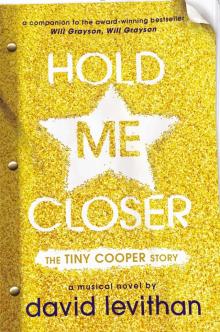 Hold Me Closer: The Tiny Cooper Story
Hold Me Closer: The Tiny Cooper Story The Full Spectrum
The Full Spectrum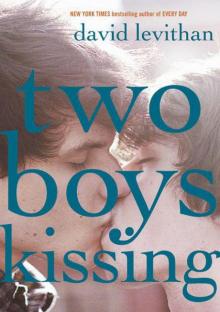 Two Boys Kissing
Two Boys Kissing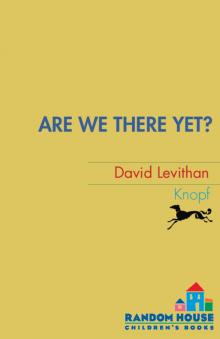 Are We There Yet?
Are We There Yet?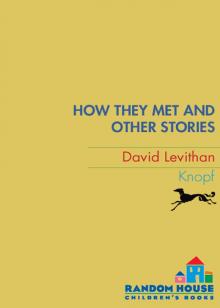 How They Met and Other Stories
How They Met and Other Stories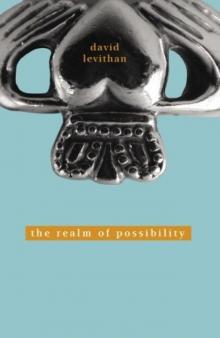 The Realm of Possibility
The Realm of Possibility Love Is the Higher Law
Love Is the Higher Law 19 Love Songs
19 Love Songs Another Day
Another Day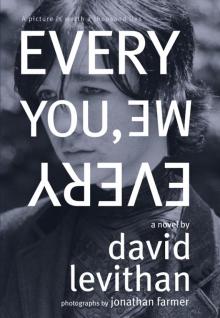 Every You, Every Me
Every You, Every Me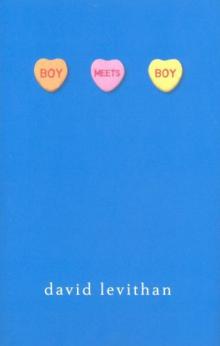 Boy Meets Boy
Boy Meets Boy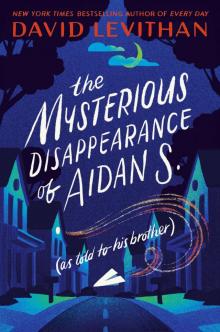 The Mysterious Disappearance of Aidan S. (as told to his brother)
The Mysterious Disappearance of Aidan S. (as told to his brother) 21 Proms
21 Proms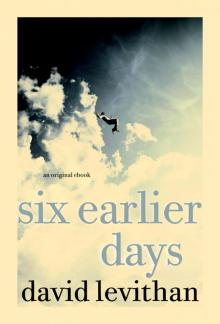 Six Earlier Days
Six Earlier Days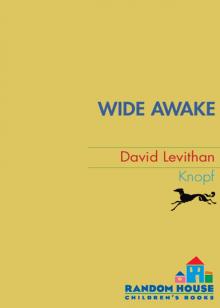 Wide Awake
Wide Awake Take Me With You When You Go
Take Me With You When You Go Someday
Someday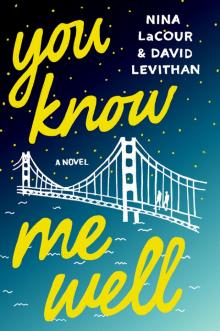 You Know Me Well
You Know Me Well Sam and Ilsa's Last Hurrah
Sam and Ilsa's Last Hurrah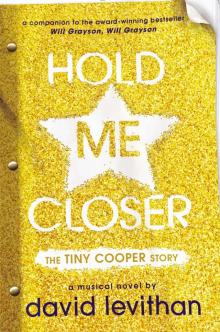 Hold Me Closer
Hold Me Closer Likely Story!
Likely Story!